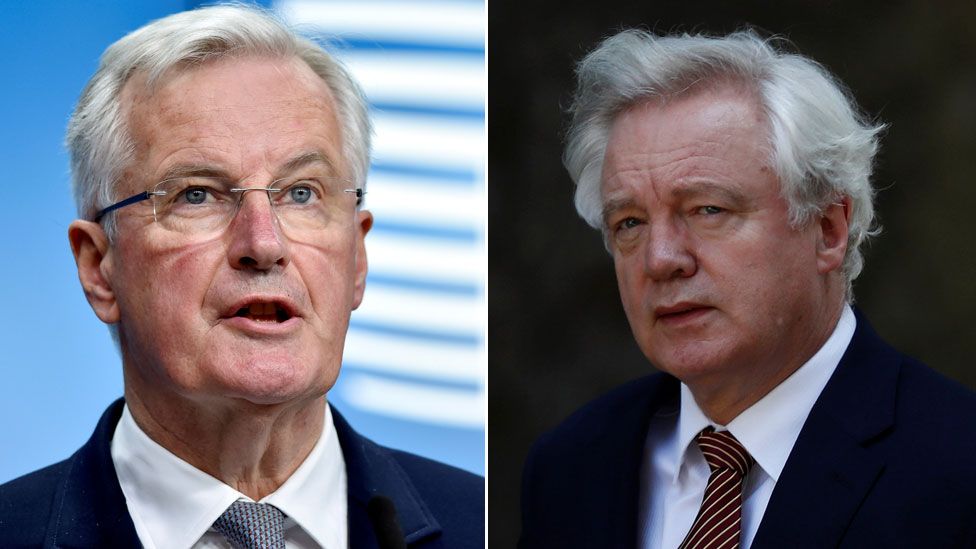Brexit talks 'to focus on withdrawal first'
- Published
- comments

Formal Brexit negotiations will first focus on issues to do with the UK's withdrawal from the EU, as part of a sequenced approach to talks, the European Commission has said.
The BBC has been told by EU sources that the talks will follow the EU's preferred pattern of exit negotiations first, with the future relations between the two sides at a later date.
The UK's Department for Exiting the EU said it still held the view that both withdrawal and future relations should be agreed at the same time.
Brexit negotiations are due to start on Monday in Brussels, but that will be the only day of talks next week.
The talks are set to continue every month throughout the summer.
The European Commission said "separation issues", such as citizens' rights and the UK's financial obligations, would be discussed first as part of its sequenced approach to talks.
That's what the EU always insisted on, the BBC's Europe correspondent Damian Grammaticas reports.
EU sources have told the BBC they believed the UK had understood this.
The sources said the EU hoped to move on to discussing a trade deal in October, if enough progress has been made.
Monday's talks between Brexit Secretary David Davis and EU negotiator Michel Barnier follow preliminary negotiations in Brussels between officials.
In a statement the European Commission said: "The opening of negotiations at political level next week will focus on issues related to citizens' rights, the financial settlement, the Northern Irish border and other separation issues, as part of the sequenced approach to the talks.
"Both sides will also discuss the structure of the negotiations and the issues that need to be addressed over the coming months."
A spokesman for Mr Davis's Brexit department said: "We have been crystal clear about our approach to these negotiations.
"As we set out in the Article 50 letter, our view is that withdrawal agreement and terms of the future relationship must be agreed alongside each other. We are clear this is what is set out in Article 50.
"We believe that the withdrawal process cannot be concluded without the future relationship also being taken into account.
"As the EU has itself said, 'nothing is agreed, until everything is agreed'."
'First aim'
The spokesman added that although some issues would be given early priority "the withdrawal and future are intimately linked".
"In particular, we want to move ahead on securing the rights of EU citizens in the UK and UK citizens living in the EU. We want to end the anxiety facing four million citizens.
"That has always been our first aim and that is what we will do."
David Davis has said the UK will pay what was legally due, in line with its rights and obligations, but "not just what the EU wants", following reports the "divorce bill" could be 100bn euros (£87bn).
Mr Barnier, the EU's chief negotiator, has said there was no desire to punish the UK but "its accounts must be settled".
"There is no Brexit bill. The final settlement is all about settling the accounts," he said last month.
'Viable option'
In Prime Minister Theresa May's letter triggering Article 50, she states: "We believe it's necessary to agree the terms of our future partnership alongside those of our withdrawal from the EU.'
But European Council president Donald Tusk and other senior EU officials have consistently ruled out parallel talks.
Labour's Shadow Brexit secretary Sir Keir Starmer has written to David Davis urging him to "reset" the government's "belligerent and reckless" approach to leaving the EU.
In the letter, obtained by the Financial Times, Sir Keir warned that Theresa May's "inflexible" stance "makes a good deal for Britain less likely, not more likely".
He urged ministers to make jobs and the economy their priority in negotiations, echoing comments earlier by Chancellor Philip Hammond.
Sir Keir said the government should now drop their claim that "no deal is better than a bad deal" on Brexit, saying it had "never been a viable option".
"To threaten to jump off a cliff rather than to be pushed is not a viable negotiating strategy," he said.
Labour is seeking regular meetings with the most senior civil servant at the Department for Exiting the EU, saying it needs to be ready to take over negotiations at any stage if Mrs May's government falls.
- Published16 June 2017
- Published15 June 2017
- Published3 May 2017
- Published31 March 2017